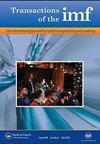Investigation of the Interaction Between Cu2-x S +So Coatings and Pd(II) Ions by Cyclic Voltammetry and X-ray Photoelectron Spectroscopy
IF 1.5
4区 材料科学
Q4 ELECTROCHEMISTRY
Transactions of The Institute of Metal Finishing
Pub Date : 1999-01-01
DOI:10.1080/00202967.1999.11871291
引用次数: 1
Abstract
The interaction between Pd 2+ ions and Cu 2-x S coating formed by three cycles and containing ∼30 at.% of elementary S has been investigated by the methods of cyclic voltammetry and photoelectron spectroscopy (one cycle of coating formation includes treatment of the surface with Cu(I)+Cu(II) ammoniate solution, hydrolysis of the adsorbed copper compounds and sulphidation of copper oxygen compounds in Na 2 S n solution). After exposure of such a coating to Pd 2+ ions (1.7 mM PdCl 2 , pH=2), an exchange as well as a redox interaction between the coating components and Pd 2+ ions has been shown to occur Due to this the amount of copper in the coating decreases from 2 to 4 times and that ofsulphur from 1.5 to 5 times. The coating modified in such a way has been found to contain up to 75 at.% of palladium, ∼90% of it being in a metallic state. It has been determined that at the beginning S 0 is bound into a soluble compound: 2Pd 2+ + S 0 + 3H 2 O → 2Pd 0 + H 2 SO 3 + 4H + . The Cu 2 S present in the coating is considered to interact with Pd 2+ , with the formation of Pd 0 and CuPdS 2 , while CuS reacts most likely according to the reaction: CuS + 3Pd 2+ + 3H 2 O → 3Pd 0 + H 2 SO 3 + Cu 2+ + 4H + . The Cu 2-x S + S 0 coating formed on a dielectric and modified with Pd 2+ , contrary to the initial Cu 2-x S + S 0 coating, can be plated with copper from any electrolyte for copper deposition.循环伏安法和x射线光电子能谱法研究Cu2-x S +So涂层与Pd(II)离子的相互作用
Pd +离子与含~ 30 at的三次循环形成的cu2 -x S涂层之间的相互作用。用循环伏安法和光电子能谱法研究了%的元素S(一个周期的涂层形成包括Cu(I)+Cu(II)氨化溶液对表面的处理,吸附的铜化合物的水解和铜氧化合物在na2sn溶液中的硫化)。在这种涂层暴露于Pd +离子(1.7 mM PdCl 2, pH=2)后,涂层成分与Pd +离子之间发生交换和氧化还原相互作用。由于这种相互作用,涂层中的铜量从2减少到4倍,硫从1.5减少到5倍。用这种方法改性的涂层已被发现含有高达75个at。%的钯,约90%的钯处于金属状态。经测定,最初s0结合成可溶性化合物:2Pd 2+ + s0 + 3h2o→2Pd 0 + h2so3 + 4H +。涂层中存在的cu2s被认为与pd2 +相互作用,形成Pd 0和cupd2,而Cu最可能的反应是:Cu + 3Pd 2+ + 3h2o→3Pd 0 + h2so3 + cu2 + + 4H +。与最初的Cu 2-x S + S 0涂层不同,在电介质上形成用Pd 2+修饰的Cu 2-x S + S 0涂层,可以用任何电解质镀铜。
本文章由计算机程序翻译,如有差异,请以英文原文为准。
求助全文
约1分钟内获得全文
求助全文
来源期刊

Transactions of The Institute of Metal Finishing
工程技术-材料科学:膜
CiteScore
3.40
自引率
10.50%
发文量
62
审稿时长
3 months
期刊介绍:
Transactions of the Institute of Metal Finishing provides international peer-reviewed coverage of all aspects of surface finishing and surface engineering, from fundamental research to in-service applications. The coverage is principally concerned with the application of surface engineering and coating technologies to enhance the properties of engineering components and assemblies. These techniques include electroplating and electroless plating and their pre- and post-treatments, thus embracing all cleaning pickling and chemical conversion processes, and also complementary processes such as anodising. Increasingly, other processes are becoming important particularly regarding surface profile, texture, opacity, contact integrity, etc.
 求助内容:
求助内容: 应助结果提醒方式:
应助结果提醒方式:


